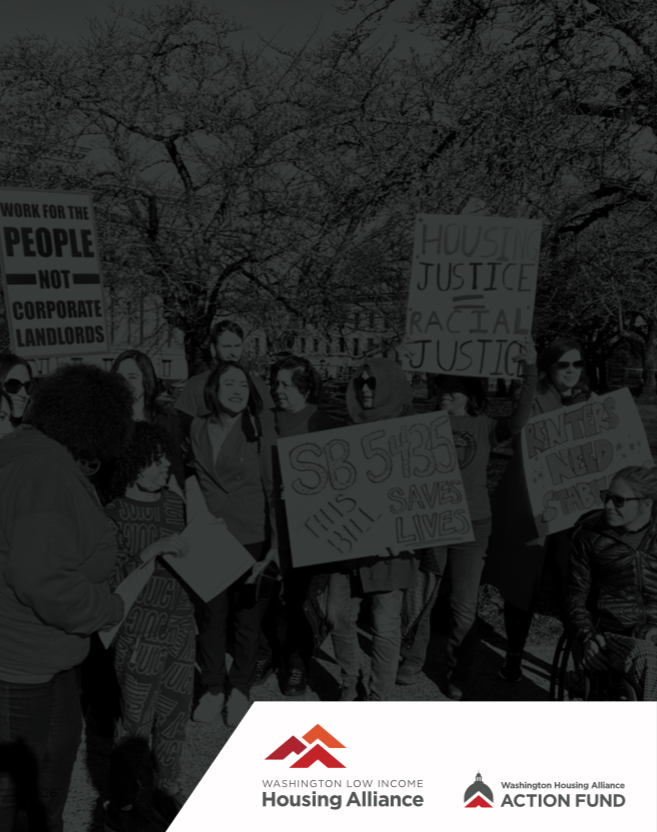Scroll down to read the Web presentation of the Roadmap to Housing Justice. You can also download the PDF version.
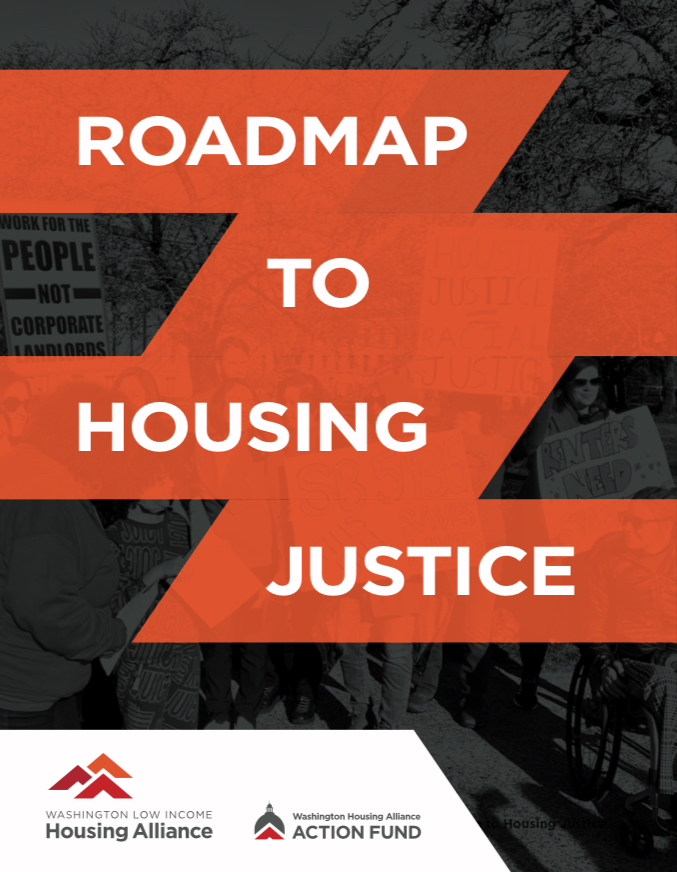

It is where we nurture our children, age with dignity, and recover from illness. It is where we take care of one another and where we rest after a hard day’s work. A home is the foundation on which our lives are built.
Today, because of unfair rules and laws, too many Washingtonians are left merely surviving. Too many in our communities are living in unhealthy housing that makes us sick. Too many of us live constantly under threat that one unforeseen problem will have us out on the street. Corporate property developers who put money for investors over communities’ needs, real estate industry lobbyists, and the lawmakers who side with them are rigging the rules to make it harder for people to find and keep a home.
This document, and the just future it imagines, is an invitation to everyone who cares about our communities. Together, we can ensure housing is within reach for everyone in Washington State. That means dreaming big and winning bold victories. More than three-quarters of Washingtonians believe it costs too much to rent or buy a home. More than two-thirds of us agree that the government has a role to play to create housing for people who can’t afford market rent. 1 We are ready for change. With you we can make it happen.
The Washington Low Income Housing Alliance has over three decades of experience advocating for affordable housing. Over the years, the people and organizations who make up the Alliance have won campaigns that no one thought possible. We won Just Cause Eviction, tenants’ right to counsel, and historic investments in affordable housing. But despite those wins, housing is still a crisis. It’s time to dream bigger and win bigger.
The way things are now is unacceptable. 2 Kids grow up wheezing with asthma in poor-quality housing in rural communities and big cities. Parents work long hours, missing time to be with their children, just to make the rent. Elders skip meals and medication to keep a roof over their heads. Too many young people and working people can’t see a future where they own a home or rent a stable home. People live outside, vulnerable, and unsafe. All too often, when economic growth comes to disinvested communities, low-income people and people of color get forced out. Generations are carrying the weight of history that is heavy with traumas of homelessness, evictions, racial segregation, and harmful housing inequities. 3 It doesn’t have to be this way.
Change begins with our collective imagination of a future where each of us has a safe place to lay our head at night. By working together, we can ensure that our lawmakers pass laws so that every person, from our kids to our elders, has a place of rest and safety. We can repair the harms caused by racist and unfair policies and practices. We can change the trajectory toward a just future for today’s Washingtonians and the next generations. We can make a home for everyone, where we care for ourselves, our loved ones, and our communities.

Help make this Roadmap possible by making a donation!

Whether we are renters, homeowners, or struggling without a home, we can unite and act to create housing justice. From the historic Hilltop neighborhood of Tacoma to the beauty of the Methow Valley, to towns along the mighty Columbia River, to the fertile fields of the Yakima Valley, people like you are coming together to ensure everyone has a home.

To win them will take power, persistence, and the voices and actions of all of us. All of us means everyone who imagines a future where everyone has a home; renters, homeowners, people who have survived homelessness, Black, Brown, and white.

Call on your lawmakers to get Washington on the road to housing justice at wliha.org/roadmaptohousingjusticeaction.
We are all powerful, and we are even stronger when we act together. Get involved with the Housing Alliance by visiting wliha.org/takeaction. You can be a leader with the Resident Action Project, bring your district together to speak up as a legislative district lead, and join us in learning and action.
Who drafted the Roadmap to Housing Justice?
This path forward is the product of many voices and dreams. It comes from years of advocacy for housing justice and deep listening. It comes from a shared history of struggle alongside members and allies around the state. It is rooted in policy expertise, data, stories, lived experience, history, and principles of anti-racism and racial equity.
To create the elements of this Roadmap to Housing Justice, the Housing Alliance started with listening. The results reflect hundreds of conversations, survey responses, and listening sessions.
Whether you helped write this document, or you are just reading it now, every one of us has a role to play in making the road home.
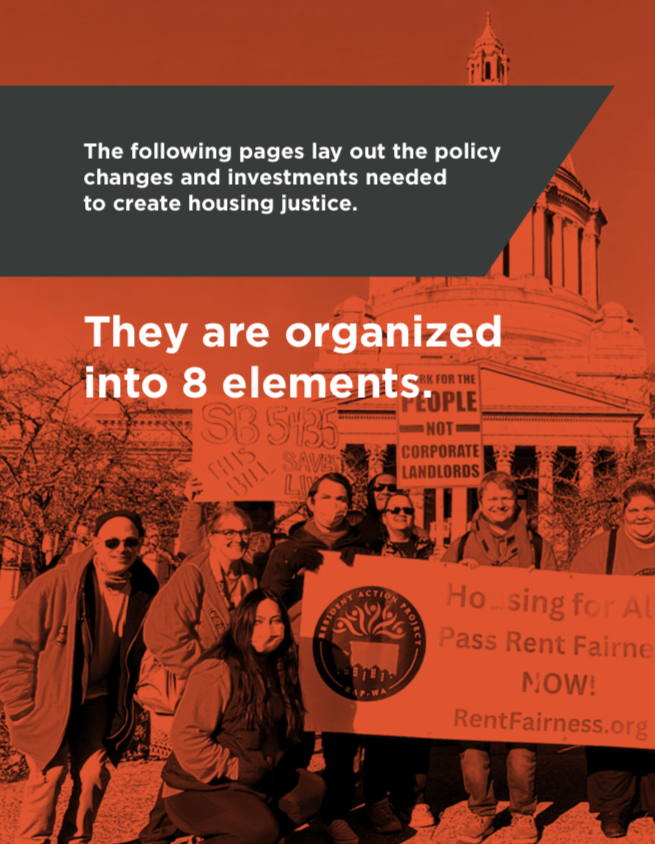
1. Fund housing at the scale of need and urgently speed up affordable housing production.
2. Stabilize rents statewide for tenants and manufactured home owners.
3. Create equitable access to homeownership – and the wealth it can generate – for Black, Brown, and Indigenous people.
4. Make rules and laws clear and fair so that tenants can have safe, healthy homes, be secure in our homes, and have the freedom to plan for the future.
5. Build a future of racial justice and social equity into housing policies, practices, and investments.
6. Pass policies and invest resources so that people can thrive in place, put down roots, and benefit from economic development and growth in neighborhoods, towns, and cities.
7. Protect people experiencing homelessness until everyone has a home.
8. Prevent homelessness by taking care of our neighbors with good jobs, access to health care, and support in hard times.
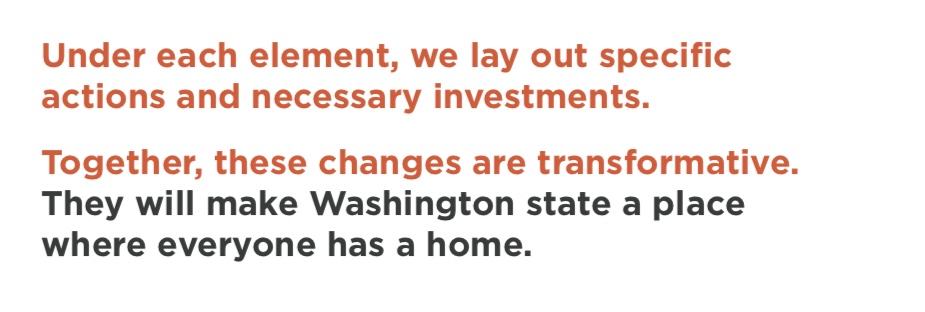

Scale up the investment in the Washington State Housing Trust Fund to meet the real needs for truly affordable housing. The Housing Trust Fund has helped build homes in every corner of Washington state. It is the catalyst that helps communities build affordable housing. We have joined together; tenants, advocates, and lawmakers, to win big increases in funding for the Housing Trust Fund, including $400 million in 2023. That’s a number that some people didn’t think possible, but now it is reality. To meet the scale of need, it’s clear we need to ramp up annual funding.
How much more funding is needed for the Housing Trust Fund? Research by the Washington State Department of Commerce lays out how much housing we are projected to need in Washington so that everyone can have a home, no matter where they live or how much money they make. The research breaks down how many homes need to be built and how affordable they need to be, from deeply subsidized housing for people with limited or no- income to affordable housing for working people. The data makes it clear that the amount that is needed has to scale beyond what was previously considered. The number is not millions, it is billions. 4,5 Lawmakers need to fund housing with progressive revenue.
Investments in building affordable homes must be coupled with funding that helps nonprofits and public housing authorities operate those buildings while keeping rents affordable and that ensures that residents have access to the services they need.
Make it easier to build affordable housing. Establish clear, consistent rules for approving new affordable housing developments. Make the approval process simpler and less expensive.

Build affordable housing into new developments. We know that building more market-rate housing will not, by itself, create the affordable housing that we need to keep our neighbors from becoming homeless. 6 Ideally, new construction should include housing that is affordable long-term to people with low incomes and working class people. Any incentive program to increase supply should include affordable housing requirements and tenant protections.
Welcome affordable housing. People should be able to choose where to live. Prohibit zoning or design restrictions that effectively block the building of affordable housing.
Use the land we have. The high cost of land often stands in the way of building affordable housing. Repurpose available publicly-owned land for housing.
Invest in rapid workforce development for skilled jobs in housing construction and repair in cities and rural communities. Across our state mold is making people sick in homes with leaks and bad windows. Old appliances are inefficient and cause pollution. The climate crisis is worsening heat waves and extreme weather. People need safe and healthy homes. Weatherization programs help, but aren’t reaching everyone. Projects to build and repair housing are slowed down by worker shortages. If we invest in workers and weatherization programs then people across our state can have good jobs building healthy housing.

Keep rent increases reasonable and predictable so tenants can plan and budget. Limit rent increases each year to reasonable levels.
Stop rent increases from being a tool to punish, displace, or deny tenants of their rights. Provide tenants with a mechanism to challenge excessive rent increases that would result in displacement, deny them of their rights under the law, or that are issued when the landlord is failing to uphold their own responsibilities under the law.
Provide tenants with more time to adjust to rent increases. Big rent increases on short notice force people into homelessness. More time to plan can avert a crisis.
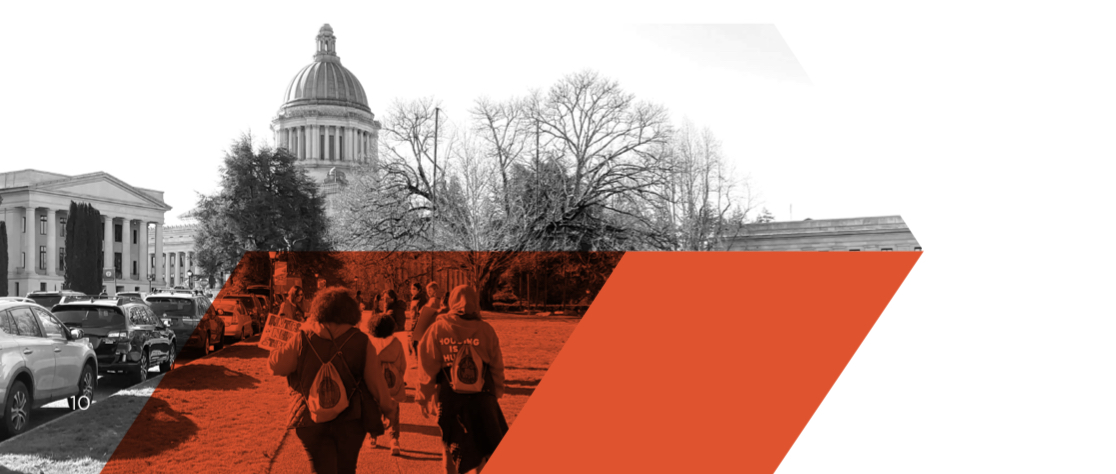
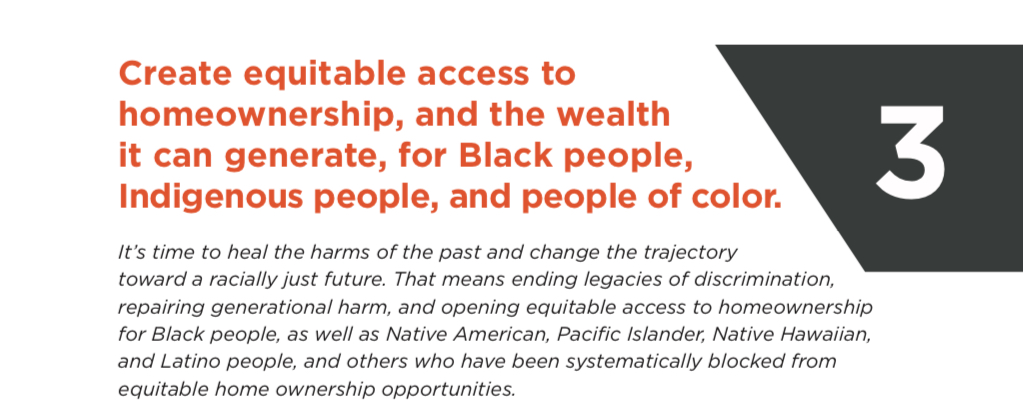
Invest in community development institutions and community organizations rooted in Black communities and diverse cultural communities. To create equity, we need community institutions that are by and for people impacted by discrimination and institutional racism to create, finance, develop, and steward all kinds of homeownership opportunities.
Increase funding for direct assistance to Black and Indigenous homebuyers. Denial of access to homeownership over multiple generations has stolen billions 7 in wealth from Black people, Indigenous people, and other People of Color. It’s time to repair harm and increase funding to cover the costs of getting people into a home.
Eliminate racist and predatory practices in mortgage lending and real estate practices. Fund enforcement of existing laws, amend laws to eliminate bias and unfair practices in credit scoring and collections, and hold institutions and corporations accountable to affirmatively further fair housing.
Open up equitable access to home ownership opportunities to Native American people in Washington state. State agencies and lawmakers should collaborate with tribal governments and Native American-led institutions to address what Native American peoples need from the state to support housing development and to change rules, laws, and practices to remove barriers to getting a mortgage. They should also end disparities in mortgage terms for Native American borrowers, both on tribal lands and off.
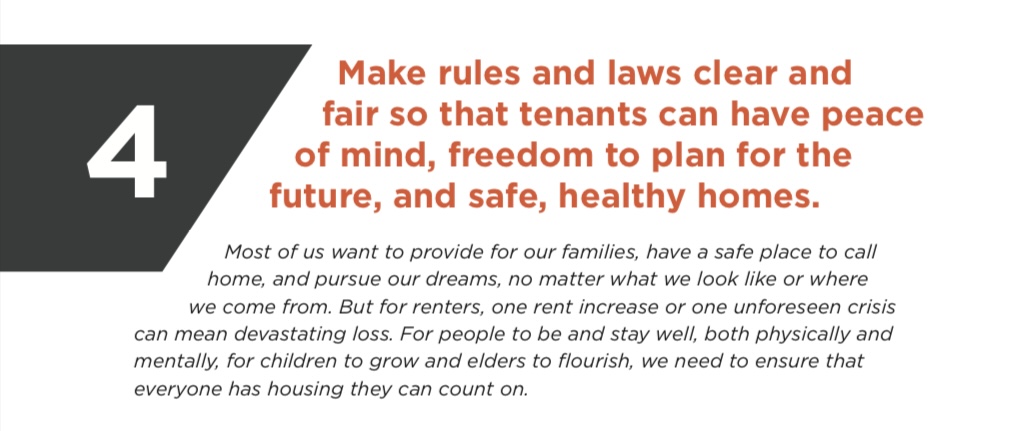
Make the protections in the Residential Landlord Tenant Act enforceable by a state agency. Tenants need somewhere to turn when the landlord breaks the law.
Limit fees. Excessive and arbitrary fees are hurting people who already struggle to pay the rent. Too many tenants are being slammed with ever- rising late fees, screening fees, cleaning fees, and more. Limit fees and protect tenants from evictions based on fees.
Create stability and fairness for ALL tenants statewide by closing the loophole that allows no-cause eviction at the end of a lease. Being forced to move is expensive. The disruption hurts kids and makes it hard for them to succeed in school. Being uprooted can be devastating for elders and people with disabilities. Landlords should have to provide a just cause reason to terminate any tenancy, including at the end of the lease for a specified term. This will protect tenants from landlords who will use this as a loophole to displace them and raise the rent.

Limit evictions for small amounts of late rent. Eviction is devastating economically for families and communities and causes long term harm to children and elders. Just having an eviction filed against a tenant can make it impossible to pass screening criteria to get into a new place to live. No one should be evicted for a small amount of late rent. Robust rent assistance should be available to help get people through hard times.
Provide funds and resources to help renters, manufactured homeowners, and low-income homeowners to adapt to the climate crisis. Everyone needs protections from extreme heat and cold and help making our homes safe as we face the climate crisis.
Protect tenants’ right to organize. When tenants face unfair and illegal actions, we deserve to work together and use our rights to protect ourselves, our families, and our communities.
Protect renters who welcome friends and relatives who are facing homelessness into their homes, from eviction based on occupancy rules. It should not be against the rules to take care of loved ones.
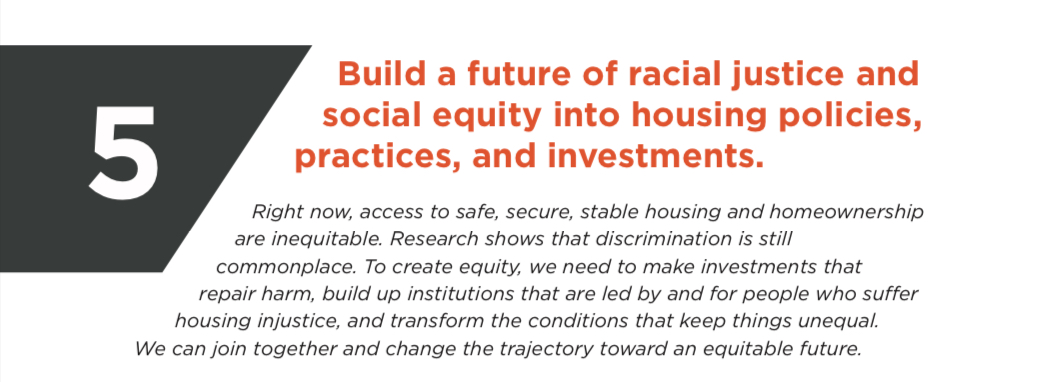
Invest in capacity building and technical support to organizations led by and for communities of color, people with disabilities, rural communities, immigrants, and LGBTQIA+ people. Open up access to state housing funds to marginalized and disinvested communities by providing resources, information and support.
Ensure state agencies are listening to people and communities most impacted by housing issues. Update membership and participation in state housing advisory groups so that they are inclusive and welcoming. People directly impacted by housing disparities should have meaningful influence over decisions.
Increase accessible housing for people with disabilities. Update rules and laws so that accessibility features are common and plentiful in new construction. Provide robust resources to help modify homes to accommodate disabilities for both renters and homeowners.
Stop discrimination. Strengthen enforcement of laws against housing discrimination, including source of income discrimination. Fix loopholes that allow property owners to use arbitrary rules, such as requiring an income greater than 3x the rent, that can hide illegal discrimination.
Build permanently supportive housing for people who are living with physical disabilities, substance use disorders, or mental health and behavioral health needs in all communities. Create housing options in consultation with people directly impacted by mental health and substance use disorder. Provide sufficient funds to support the ongoing operation of permanent supportive housing, necessary building maintenance, and the services residents need to lead healthy and meaningful lives.

Support people transitioning into communities after experiencing incarceration. Change laws regarding screening requirements and rules so that people who are coming home and transitioning into communities after incarceration can access all housing options.
Help young adults move from the foster care system into housing. Youth and young adults exiting the foster care system deserve a safe and stable place to land and move into adulthood. Create sufficient housing options for young people who are transitioning out of the foster care system and need affordable, stable, supportive, or independent housing.
Invest in proven models of permanently affordable home ownership, including resident-owned, limited-equity cooperatives, and community land trusts.
Scale up a diverse workforce to build the homes we need and generate good jobs for working people. Good jobs help people get housing and our state needs a skilled workforce to build the housing our communities require. Pass policies and investments to scale up and increase access to workforce training programs to build and rehabilitate housing.
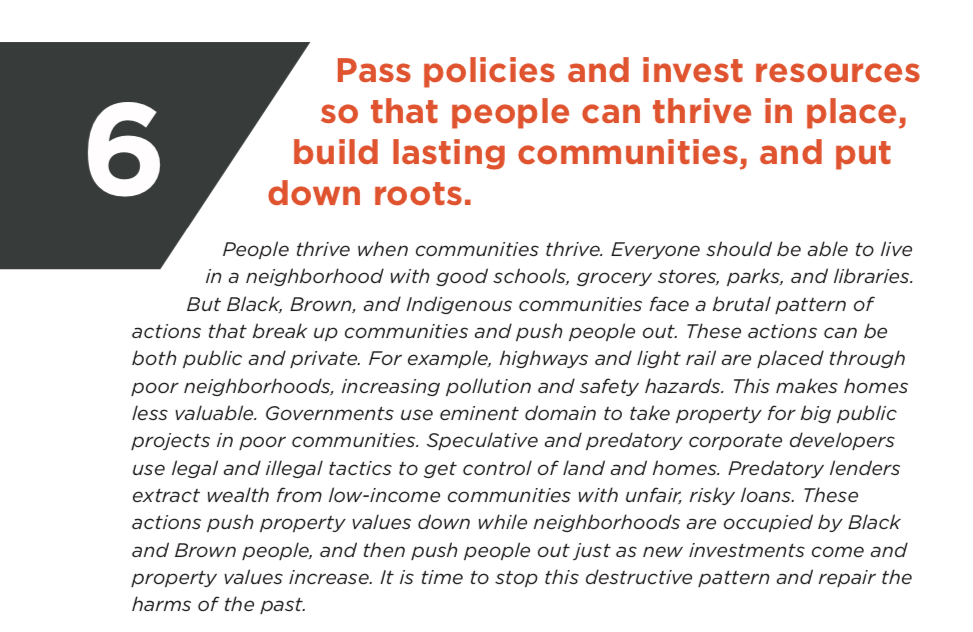
Invest in community land trusts and other proven, permanently affordable homeownership strategies. Permanently affordable homeownership opens the opportunity for low- and moderate-income people to buy a home. They also anchor affordability within communities forever.
Enact laws and provide funding so that tenants in apartment buildings have the first opportunity to form a co-op or identify a non-profit to purchase their homes before they face displacement or rent increases. Big rent increases often come after the sale of a building or manufactured home community. Before that happens, residents should have the opportunity to purchase their buildings or communities. Rapid access to public funding is critical to preserving affordable homes.
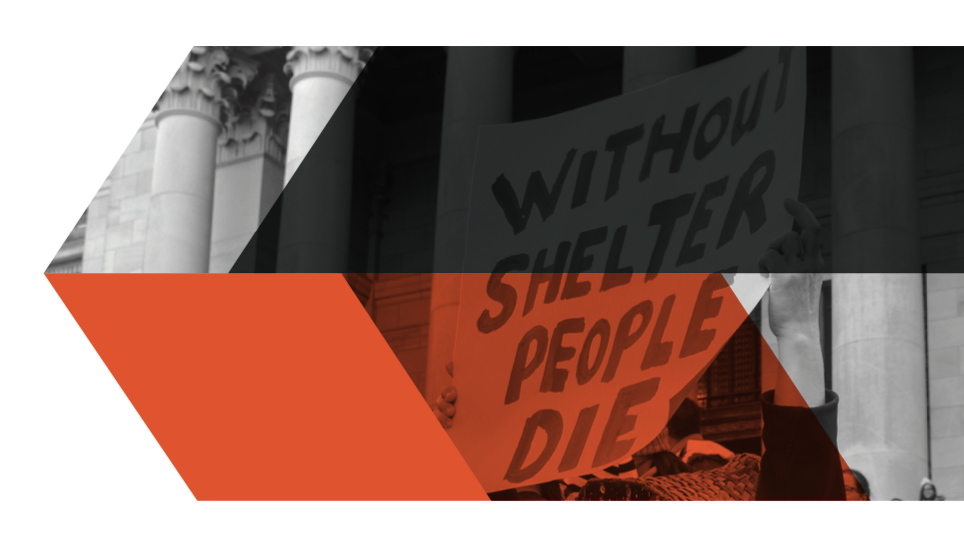
Help low- and moderate-income homeowners hold onto homes and stay rooted in place as costs rise. Provide low and moderate-income homeowners a reduction in property taxes when costs are driven up by speculative development or large-scale public projects. Outlaw predatory real estate practices that target people in tough financial times, using deceptive actions to coerce homeowners into selling their homes. Restrict big corporate buyers who use predatory practices to hoard homes for Wall Street investors.
Invest in and support disinvested rural communities. Scale up funds for workforce development and community-driven economic development. Working people deserve to have good jobs building and repairing the housing that rural communities need. Protect housing for local people by limiting the use of whole houses as short-term rentals.
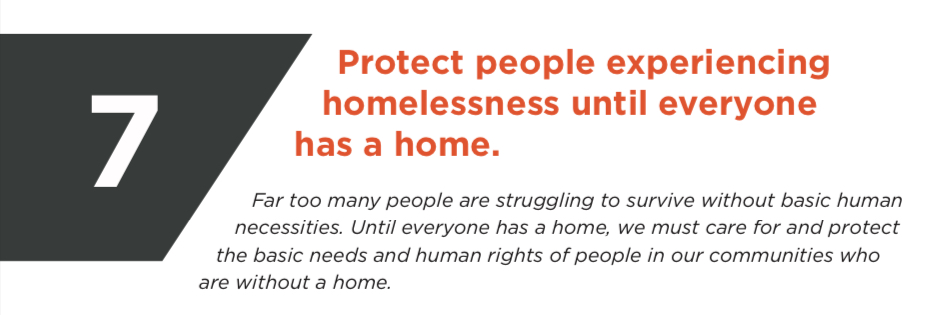
Scale up investments in homelessness services. Ensure safe shelter for everyone who needs it.
Don’t make it a crime to be homeless. Reject and repeal laws that make it a crime to live outside.
Welcome shelter and services for people facing homelessness in all communities. Implement incentives and pass laws to ensure that all communities have a safe place for people who are homeless and support to get people back into housing.
Support workers who do essential labor to support people experiencing homelessness. Workers who care for our vulnerable neighbors deserve a living wage, good health care, and safe and healthy working conditions.
End and make illegal the brutal practice of discharging people from hospitals or behavioral health institutions into homelessness. People need to heal in a safe place. Provide medical respite shelter for people without a home to heal.
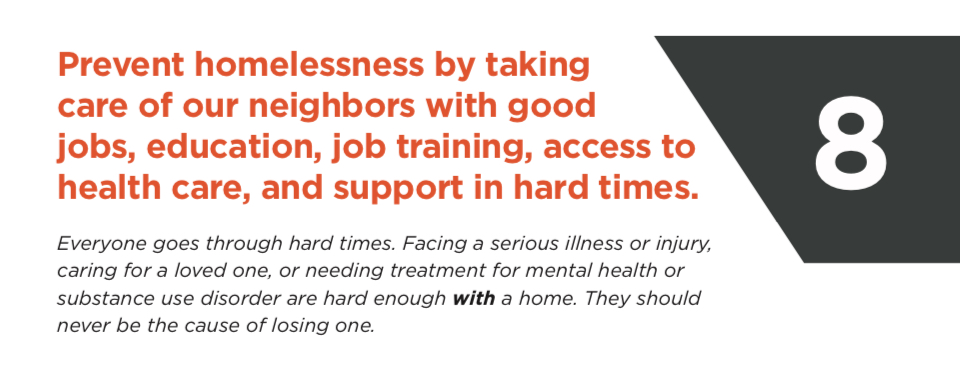
A full-time job should pay enough to have a stable, healthy home. Raise the minimum wage and protect workers. Washingtonians work hard, but far too many of us don’t get paid enough to afford rent or buy a home. No one should have to risk their life in unsafe conditions at work just to keep a roof overhead.
Dramatically scale up behavioral health and substance use disorder treatment so that they are available on demand. Access to adequate treatment helps people get better and helps communities to thrive. Children and young people need robust access to mental health care.
Open access to health insurance and care for all and hold hospitals accountable to provide community care. No one should be driven into homelessness by medical debt or an injury or illness. The state should provide access to health insurance, regardless of income or immigration status. Pass and enforce regulations that require hospitals to disclose options to pay for care and provide robust charity care.
Improve access to temporary financial support like paid family leave and unemployment insurance and expand access to cover all workers, no matter what we look like or where we were born. No one should lose their home because of illness or a temporary emergency.

Rural to urban, young and old, Black, brown, and white, we agree on solutions to our housing crisis. We are renters who have waited too long for stable homes and homeowners who want to open the door to others to become homeowners too. We are workers, laboring every day to sustain ourselves, families, and communities.
The changes called for in this road map are transformative. But this document does not define the limits of what we can do. We can and will continue to imagine the future of housing justice, one where housing is a resource we can count on and steward for our communities and future generations.
We can win the changes outlined in this road map. We can unite across differences, no matter our race, class, gender, and ability. Together we can pass laws, elect new leaders, and make the healthy, safe, joyful, future that we, our children, and the next generations deserve.

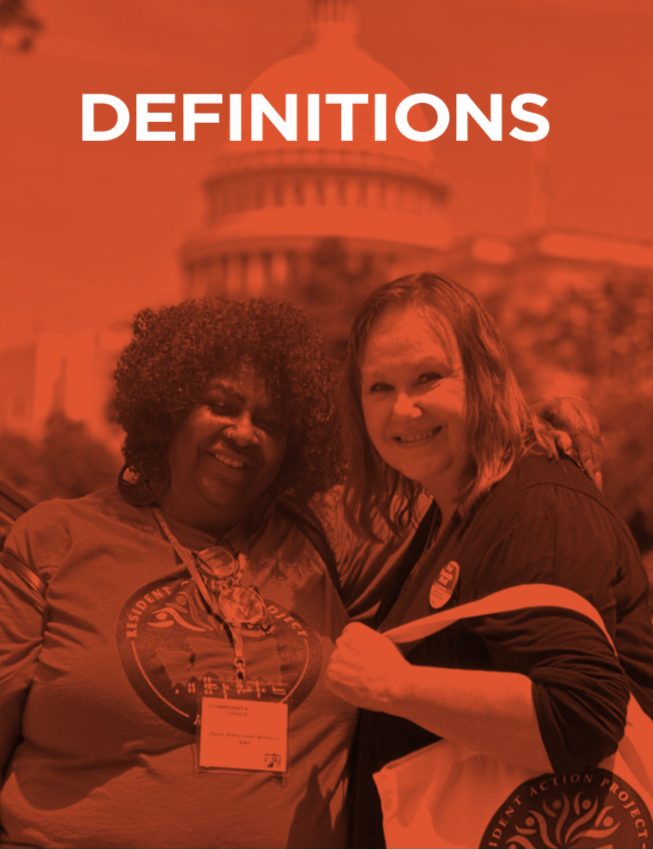
Affirmatively furthering fair housing (AFFH): A rule in federal fair housing policy that requires any entity that gets public federal funds for housing (from the Department of Housing and Urban Development, or HUD) has to show how they’re using that money to proactively end housing inequities. The legal rule applies to entities receiving federal housing funds. Any entity can take actions that affirmatively further fair housing. Learn more about AFFH from PolicyLink.
Anti-racism: the policy or practice of opposing racism and promoting racial equality.
Eminent domain: the power of the state or federal government, or a government entity like a housing authority, to take private property, if the taking is for a public purpose and the owner is compensated for the value of the property. Eminent domain has a history in America of being used in racially discriminatory ways. To learn more read Right past wrongs of racist ‘urban renewal’ and pay reparations to Seattle’s Black community and Let’s Talk About the Taking of Black Land | The Nation and The Civil Rights Implications of Eminent Domain Abuse.
Equity: The state, quality or ideal of being just, impartial, and fair. Learn more racial equity as principle and practice from Race Forward.
Institutional racism: Institutional Racism occurs within institutions. It involves unjust policies, practices, procedures, and outcomes that work better for white people than people of color, whether intentional or not. Learn more about institutional racism from Race Forward.
Progressive revenue: A progressive tax takes a larger percentage of income from high-income groups than from low-income groups and is based on the concept of ability to pay. Learn more about progressive revenue from Balance Our Tax Code and Washington State Budget & Policy Center.
Targeted universalism: Targeted universalism means setting universal goals pursued by targeted processes to achieve those goals. Learn more about targeted universalism from the Othering and Belonging Institute.

Outreach, research, and community inquiry to inform the Roadmap to Housing Justice has been both broad and deep. Over the past two plus years, inquiry has included intentional connection with people who are marginalized by historic and current housing policies and practices, and who live at the intersections of multiple marginalized identities. We are listening to people in all regions of Washington.
Community inquiry to inform the initial draft of the road map included:
- Interviews with leaders at 19 community-based organizations led by and rooted in communities of color, people with disabilities, immigrant communities, Tribes, and/or LGBTQIA+ organizations in 2022.
- Thirteen different focus groups and listening sessions in 2021 and 2022. Approximately three-quarters of the people in the focus group and listening sessions were people of color, about 40% were people with disabilities, 12% trans and non-binary people, and one quarter were currently homeless or at risk of becoming homeless.
- Extensive online Housing Alliance member and community survey in 2022.
- Compilation and review of community needs assessments, community-based organization reports, and other existing inquiry and data. Partial list here.
In Spring 2023 we organized 6 feedback sessions to share the draft elements of the road map and to hear feedback. Those sessions were attended by about 100 people, from all over the state, and included members of the Housing Alliance and diverse people with lived experiences of housing injustices. An additional 27 people provided detailed written comments. As a result of the feedback we heard, the elements were revised and incorporated into the larger road to housing justice document. The Housing Alliance board of directors and the Washington Housing Action Fund board of directors also reviewed and provided feedback, and then approved the final document.
Questions, feedback, and comments are still welcome. Please contact info@wliha.org.

1 State survey: Most people say housing is #1 issue - Washington State Department of Commerce, WA State Department of Commerce, January 11, 2023.
2 Rising Rents are Drowning Washington’s Smaller Cities, Crosscut, February 8, 2023, Out of Reach Report 2022, National Low Income Housing Coalition Improving Homeownership Rates for Black, Indigenous, and People of Color in Washington Researchers explore a pesticide link to asthma in farmworkers’ children, The World, September 7, 2018.
3 Figueroa, J. (2019, June 26). Homelessness Causes a Lifetime of Trauma. Invisible People. Retrieved June 2, 23, from https://invisiblepeople.tv/ homelessness-causes-lifetime-trauma. From our inquiry conversations with individuals across Washington state, many people named constant fear of homelessness and described emotional health impacts of housing instability, particularly those who had been homeless before or who had experienced homelessness or housing instability as children. From Redlining to Gentrification: The Policy of the Past that Affects Health Outcomes Today. HARVARD MEDICAL SCHOOL PRIMARY CARE REVIEW. Retrieved June 2, 2023.
4 Washington state will need more than 1 million homes in next 20 years, Washington State Department of Commerce, March 2, 2023.
5 Based on the current average amount the Housing Trust Fund invests per home of $100,000, in order to build the units needed year by year that would be affordable for people living with low-incomes, the cost would be in the range of $3 billion per year.
6 More Building Won’t Make Housing Affordable, The New Republic, February 9, 2023.
7 WA State Department of Commerce, Improving Homeownership Rates for Black, Indigenous and People of Color in Washington State. September, 2022. Ray, R., Perry, A. M., Harshbarger, D., Elizondo, S., & Gibbons, A. (2021, September 1). Homeownership, racial segregation, and policy solutions to racial wealth equity. Brookings.
8 State survey: Most people say housing is #1 issue, WA State Department of Commerce, January 11, 2023.
Help make this Roadmap possible by making a donation!

